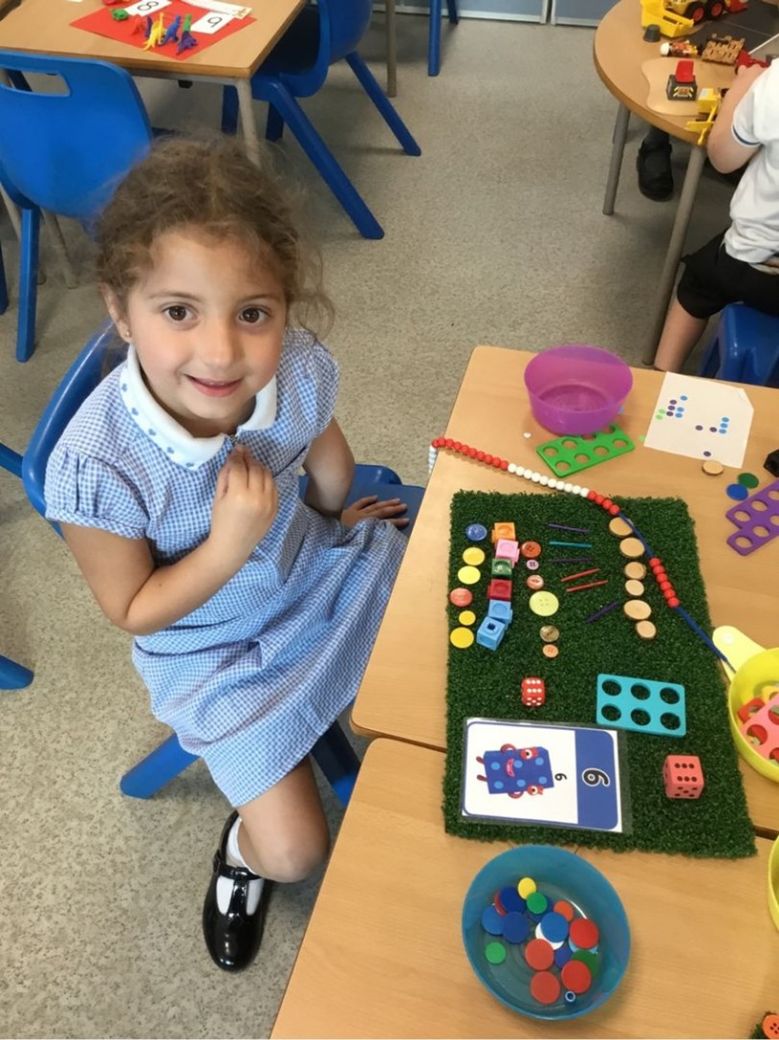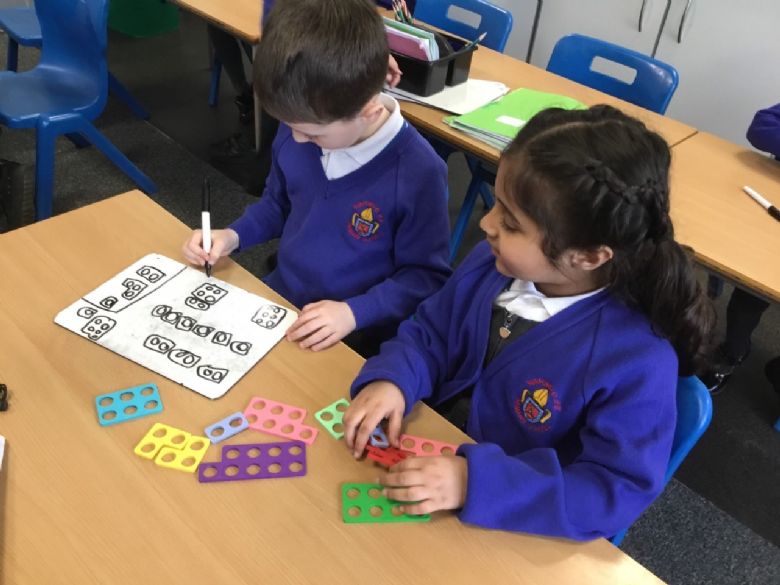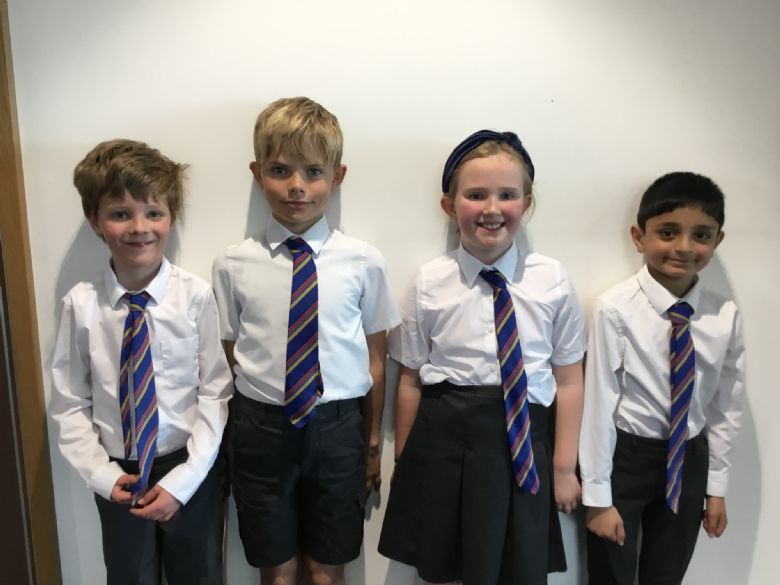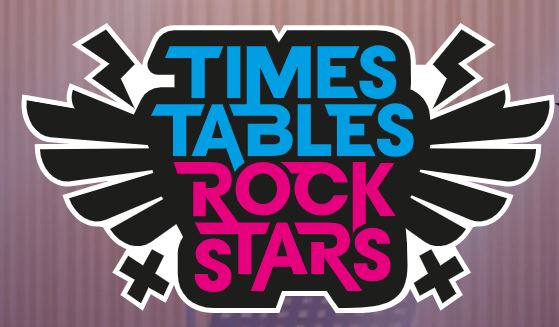Maths
At Pyrford Primary School our aim is to provide a safe, inclusive learning environment which provides children with the opportunity to develop confidence in mathematical skills, concepts and knowledge. We do this whilst encouraging them to be see the value and beauty of maths as a creative subject and as a tool for life beyond the classroom.

Aims
We aim for all children to:
- Be independent, confident and enquiring mathematicians.
- Have a positive attitude towards mathematics and a confidence to give it a go and develop resilience.
- Have a developed mathematical vocabulary beyond that used in everyday speech.
We successfully follow a mastery approach, from the Early Years Foundation Stage through to transition to KS3, where our children are taught a mathematical concept in depth, moving through small progressive steps to develop a deep, lasting understanding and competence.
Place value is the foundation of our number system and every year group revisits this number strand before moving onto calculation and other mathematics strands including measure, fractions and geometry.

Daily recall tasks are included to help develop our children’s fluency in arithmetic and embed and reinforce their understanding of mathematical methods. Rather than having to rely on derivation or guessing, we help pupils to develop ‘automatic recall’ of key concepts to prevent their working memory from becoming overloaded. Problem-solving and reasoning tasks are also supported by automaticity of facts, enabling children to draw on and make links with previous learning in order to solve more challenging age appropriate tasks.

Teaching methods in mathematics today are very different from how many adults were taught and we try to help the children understand “why” rather than just show them “how”. A rich mathematical vocabulary is taught throughout the year groups and the children are shown how to explain their reasoning and articulate their understanding of the “why”. In this way, the children can learn from one another in a collaborative, safe and inclusive environment whilst developing resilience in their own learning and respect for the ideas and learning of their peers.
In Maths, we display and learn our mantra each lesson. This is so that the children have a common understanding as to why we learn Maths in school and how useful this is as a life skill, so that we can use this learning in our everyday lives.
“The ideal aim is for pupils to attain proficiency, not just collective moments of understanding, familiarity or experience” OFSTED, 2021
Maths Newsletter
Calculation Policies Videos
EYFS Policy Videos-
KS1 Policy Videos
Year 1-
Identify and rep numbers to 20
Year 2-
Multiplying and dividing by 2, 5 & 10
LKS2 Policy Video
Year 3-
Dividing a 2-digit number by a 1-digit number
Multiplying a 2-digit number by a 1-digit number
Year 4-
Adding and Subtracting 2 fractions
Dividing 2 and 3-digit numbers by a 1- digit number
Multiplying a 3-digit number by a 1-digit number
UKS2 Policy Videos
Year 5-
Multiply non unit fractions by integers
Multiply unit fractions by integers
Year 6-
Calculation Policies
Useful websites
Click on the picture to access TT Rockstars!
https://www.topmarks.co.uk/Search.aspx?Subject=16
https://www.bbc.co.uk/bitesize/subjects/z826n39
https://www.maths-games.org/times-tables-games.html
https://www.timestables.co.uk/
https://mathsframe.co.uk/en/resources/resource/477/Multiplication-Tables-Check
Parental Support
Whiterose Maths have created a mini-series of videos called Maths with Michael to support parents with the range of strategies that are being introduced in schools today. These episodes will give you an introduction to place value, subtraction, multiplication, division, fractions and algebra.
As Maths is constantly changing to support children through learning in small steps, we understand that parents may find keeping up to date with modern teaching methods in Maths difficult. Therefore, we think that this is the perfect opportunity to introduce parents to the methods and strategies which we encourage in school.
Click here to watch Maths with Michael
SATs Information
What are the SATs?
SATs are standardised assessment tests which are administered by primary schools in England to children in both Year 2 and Year 6. This is to check their educational progress. These tests are both set and marked externally and the results are used to measure the school’s performance. Your child’s marks that they achieve within their tests will be used in conjunction with their teacher’s assessment. This in order to give a broader picture of their attainment.
From September 2023, KS1 SATs will be made non-statutory as per the government announcement in 2017. Until this date, pupils will continue to sit SATs in Year 2.
Dates for the SATs normally run over a one week period in May.
KS1
At the end of Year 2, children take SATs in:
Maths –
Paper 1 is a 25 mark arithmetic test which should take around 15 minutes.
- Paper 2 involves reasoning, problem solving and mathematical fluency. This paper has 35 marks available, will last for roughly 35 minutes, and contains a variety of question types.
KS2
The Year 6 KS2 SATs will take place between Monday 13th and Thursday 16th May.
The SATs timetable runs as follows:
Wednesday
Mathematics Paper 1: arithmetic (30 minutes)
Mathematics Paper 2: reasoning (40 minutes)
Thursday
Mathematics Paper 3: reasoning (40 minutes)
Paper 1 will consist of fixed response questions, where children have to give the correct answer to calculations, including long multiplication and division. Papers 2 and 3 will involve a number of question types, including:
- Multiple choice
- True or false
- Constrained questions, e.g. giving the answer to a calculation, drawing a shape or completing a table or chart
- Less constrained questions, where children will have to explain their approach for solving a problem
Year 4 Multiplication Check
Year 4 children will be taking part in the multiplication check in June. This test is to determine whether your child is able to confidently recall their times tables up to 12 fluently. This is essential for future success in Mathematics. This check will also help to identify if you child may need any additional support with their understanding of number as they move up through the school.
The multiplication tables check is an on-screen check which consists of 25 times tables questions.
Your child will complete 3 practice questions before starting their actual test. They will only have 6 seconds to answer each question.
In order to support your child to prepare for this check, we encourage the children to practice their times tables using TT Rockstars so that they can begin to get used to the timed conditions. If you do not have access to your child’s
For further details you can also visit www.gov.uk/STA.
Multiplication Check - Government information
Knowledge Organisers
Children's Events
In order to support the development of children’s cultural capital at Pyrford, we are able to give the children a rich and broad curriculum in Maths. Our children are given many opportunities to participate in a wide range of learning experiences beyond the Maths classroom. This can include museum trips, STEM workshops, and school and national mathematic competitions and projects. When beginning the primary school journey, many children arrive to school with different and sometimes more limited experiences than others. We want to give children the knowledge and skills to prepare them for what comes next in their lives. This includes identifying and explaining the relevant vocabulary needed throughout their education and the opportunity to link maths to real-world problem solving.

In addition to the steps taken in the classroom to provide this rich and broad curriculum, we are able to expose children to this through different events such as Maths Days, that run annually throughout the school and Maths Visits, which take part in other schools. Being able to have the opportunity to attend visits and hold Maths Days in schools allows the children to communicate with other mathematicians and partake in challenges. For example, we recently held a World Maths Day in school where each year group enjoyed brilliant, interactive activities from working with money and using numbers in games in EYFS and KS1 to splashing around with capacity, national maths challenges and working with finances in KS2.

These opportunities allow the children to think about Maths in the wider world, rather than just in the classroom. This is crucial for children to understand, as at Pyrford, we teach children to be able to see Maths in their everyday life. By being able to do this, we are able to support the pedagogy that children who know more, remember more.
Look at the images below to see some of the many ways that we are able to build upon our rich and broad curriculum in Maths.






